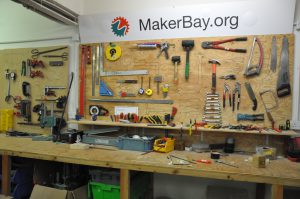It would be daunting for beginners to emulate Chan’s self-sufficiency in the home but there are places that offer space and tools for people to engage in do-it-yourself projects. MakerBay, in Yau Tong, offers workshops and training for participants to learn how to fix and make things.
“Once they come to our workshop or class and get this idea or concept [of maker culture], I consider it as a success,” says Ada Kwok Sui-ting, community developer of MakerBay. “It’s like a seed planted in them. Whether it continues to grow or not is another thing, but you have already taken the first step.”

The concept of maker spaces has taken off in the West but is new to Hong Kong. MakerBay has been promoting maker culture by collaborating with schools and opening maker classes. During the Formula E race in October, they set up a booth and offered workshops for children and their parents where they could learn how to make wooden toy cars.
“Children treasure handmade toys more when they understand making a toy is never easy,” says Kwok.
Kwok wanted to make sure that children understood that things should be repaired rather than thrown away after attending the workshop. And working at MakerBay has also made her more environmentally aware too. She insisted on fixing the screen of an old Samsung tablet even though the cost of repair was higher than that of buying a new one.
“I don’t want to produce extra rubbish. Although I don’t have the ability to fix electronic gadgets by myself, I am willing to pay a little more to reduce one more piece of rubbish on the earth,” says Kwok.
Kwok also bought a sewing machine to mend her clothes at home. The culture of fast fashion does not affect her at all as she only purchases new clothes when necessary.
“Despite my poor sewing, I am happy because at least I do not need to throw [clothes] away. Old things are always more comfortable to wear than the new ones,” she says.
MakerBay is launching a project called Fix It this month and Kwok will gather maintenance experts in various fields to teach members of the public how to fix non-functioning domestic appliances and tattered clothes. She says people do not need any specific knowledge to join the maker community, and hopes participants will be more active in spreading the idea of fixing.
In today’s disposable society, it seems we have forgotten there is an alternative to tossing old stuff away – that we can repair it. The social environment may discourage us from fixing, but if we manage to “fix” our mindset, it could be easier to “make” a change.
Edited by Cindy Gu, Wing Chan






































